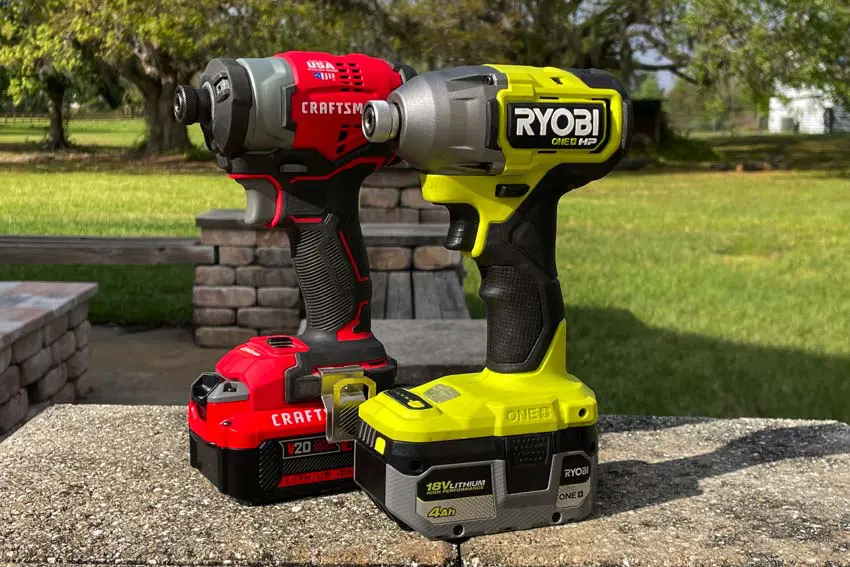Moving to the popular Prosumer class, we’re taking a deeper dive into a Craftsman vs Ryobi impact driver head-to-head review. For Craftsman, it’s the tried and true CMCF820 V20 brushless model that’s been around for several years. For Ryobi, it’s the more recent PDLID02 that’s part of the 18V One+ HP Brushless lineup.
Which one is the best in your book? Take a look at what we discovered in our testing and then let us know in the comments below!
Want more impact driver content? Check out our best impact driver recommendations for the year!
Why Not Use the Newer Craftsman Brushless RP Impact Driver?
Craftsman recently launched its Brushless RP line (RP = Runtime + Performance) and there’s a new impact driver as part of the mix. However, the V20 Brushless is still the higher performing of the two. We’ll see if Craftsman has something in the works to change that later in the year.
Craftsman Vs Ryobi Impact Driver Specifications
Here’s what the manufacturers say about both impact drivers along with the head lengths and weights we measured:
| Craftsman CMCF820 | Ryobi PCLID02 | |
| Top Speeds | 1300/2600/2900 RPM | 850/2000/2900 RPN |
| Max Impact Rate | 3800 IPM | 4000 IPM |
| Max Torque | 1700 in-lbs | 2200 in-lbs |
| Head Length | 5.4 inches | 5.5 inches |
| Bare Weight | 2.1 pounds | 2.3 pounds |
| Weight Tested Battery | 3.5 pounds | 3.9 pounds |
Craftsman Vs Ryobi Impact Driver Test Results
We ran three different performance tests to see what these impact drivers are capable of. Before jumping in, we had to decide which batteries to use. Craftsman is on a 20V Max platform while Ryobi is on an 18V. While it may look like Craftsman is at a higher voltage, they’re actually the same—20V at their maximum charge states and 18V at their nominal charge states. You can read more about 20V Max vs 18V.
We chose 4.0Ah batteries for both tools. Craftsman doesn’t have any advanced packs just yet, so we used the standard battery. Ryobi designed the HP Brushless line specifically to take advantage of its High Performance batteries, so we used the advanced battery for it.
The first test is a medium-load test driving a 6-inch x 1/4-inch GRK Fasteners RSS screw into stacked OSB subfloor. The result is the average of three tests.

The second test is timed to see how far each model can drive a 10-inch x 1/2-inch lag screw into the same material in 30 seconds. The result is the average of how much of the screw remained proud in three tests—less is better.

The third test is to see how long it takes to break loose a nut that is set to 150 ft-lbs (1800 in-lbs). The result is the total time added together for 5 bolts.
| Craftsman CMCF820 | Ryobi PCLID02 | |
| RSS Screw Average | 12.3 seconds | 16.1 seconds |
| Lag Screw Average | 4.4 inches | 4.0 inches |
| Nut-Busting Total | 7.9 seconds | 7.2 seconds |
Craftsman Vs Ryobi Impact Driver Feature Highlights
Craftsman CMCF820

- Brushless motor
- 3 standard speeds
- Tri-beam LEDs surrounding the collet
- One-hand bit insertion and active ejection
- Made in the USA with global materials
Ryobi PCLID02

- Brushless motor
- 3 standard speeds plus an assist mode
- One-hand bit insertion and active ejection
Craftsman Vs Ryobi Impact Driver Price
| Craftsman CMCF820 | Ryobi PCLID02 | |
| Bare Tool | $99.00 | $119.00 |
| Kit | $179.00 (2 x 2.0Ah) | $159.00 (1 x 2.0Ah battery) |
| Basic Combo | $249.00 Impact Driver Hammer Drill 2 x 2.0Ah batteries Charger | $229.00 Impact Driver Hammer Drill 2.0Ah Battery 4.0Ah Battery Charger |
| Warranty | 3 years | 3 years |
So who’s your winner? Let us know in the comments below—bonus points for telling us why!



